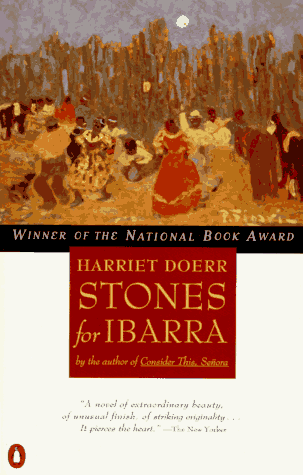

Stones for Ibarra--Harriet Doerr
reviewed by goodyear kirkman walker 5.12.04
 This
was Doerr's first book, and winner of the 1985 National Book Award for First
Fiction. It was loaned to me by a friend, who thought I "might like it."
I did, but I suspect for reasons other than intended.
This
was Doerr's first book, and winner of the 1985 National Book Award for First
Fiction. It was loaned to me by a friend, who thought I "might like it."
I did, but I suspect for reasons other than intended.
The book is an easy read, and can be done in patches, as it comes out as more of a series of vignettes than a novel. I can't say that there is much new here, unless you do not have much experience with the culture of Mexico. There is, however, some beautiful language.
Richard and Sara Evans, just over and just under forty sell, hock or mortgage everything they own in San Francisco and head for Ibarra, a village in north central Mexico considerably off the beaten, or any other, track. Here they plan to reopen grandfather's copper mine, closed during the revolution of 1910. They plan to live out their lives here, connected to the place and each other. Not a lot of thought here. They are led on by recollections of an ancient aunt, some old photographs, agnostic faith and a huge helping of naivete.
The people of Ibarra are mystified. They respect the Evans, but are totally confused by them. They aren't Catholic, must have huge amounts of money but don't spend any and they don't have a clue how to live here. The villagers try to help, all the while taking a piece of life here, a peso there and a little copper ore if possible. The book is about what the villagers teach the Evans about life and the finality of fate. For fate, and death, is everywhere. It must be accepted, or you go crazy. Richard is diagnosed with leukemia shortly after arriving, and Sara keeps pretending it isn't happening. She has a remarkable facility of making things up. A villager will volunteer that Tia Maria once worked on the rancho of the local Don, and Sara soon has Maria and the Dona's son involved in an affair that ends with a tragic horse accident.
A lovely bit of writing comes from a visit of a Canadian geologist to the mine:
"Sara understood this passion that beset geologists. Their minds were heavy with theories shaped by fire and water, their pockets weighted with residual bits of evidence chipped from road cuts and canyon walls, identifiable, able to be pigeonholed in time that stretched back five hundred million years. She understood that the rock in the Canadian's hand was likely to endure intact long after the bones of the four people in this room would be discovered set in sandstone among snail shells and ferns."
We learn how Ibarra got
its taxi, how Kid Munoz was blinded boxing in the US, about the endless succession
of assistants for the Cura and the equally endless succession of children for
Paz, the local teenage hooker. The mines fortunes rise and fall with the price
of copper in the outside world, and Richard's six years pass relentlessly. Sara
learns Spanish, turns aside from local cures and assumes that Richard won't
really die. Only the heat, the lack of rain, and Fate remain constant. The Bishop
appears once a year for Ibarra's saint's day, some Baptists show up when a local
beggar woman dies and is discovered to have a small fortune squirreled away
and the Evans get invited to the annual Cura's picnic. Through it all Sara picks
up bits and pieces of life, and makes up the rest. Disquieting, but lovely.
Which pretty much sums up the book.